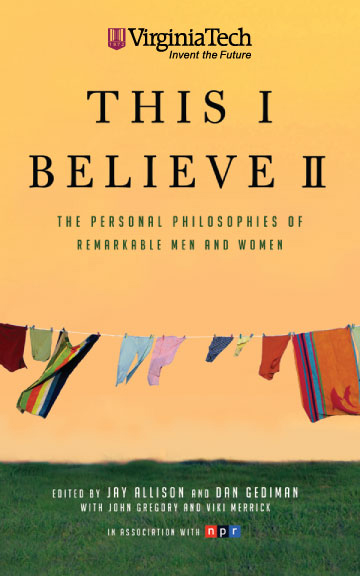'This I Believe II' named Virginia Tech's 2011-2012 Common Book

This I Believe II, a collection of 75 short essays of personal philosophies by remarkable men and women — including writers both known and unknown — was selected as the university’s 2011-2012 Common Book.
The book resonated strongly with members of the student body invited to review the book, as well members of the Common Book Committee, comprised of staff and faculty members.
In its 13th year, the Common Book Project gives new and transfer undergraduate students a common academic experience during their first year at Virginia Tech.
The year’s book choice was unveiled at a special ceremony yesterday on the steps of Burruss Hall, with members of the university community in attendance. “It is vitally important for students to build a strong foundation during the first year," noted Daniel Wubah, vice president and dean for undergraduate education. “Virginia Tech is taking steps to provide the most robust and vibrant first year experience at a land grant university. That is where the Common Book comes in.”
Each year, faculty members of first-year and transfer students are encouraged to integrate the common book into their curriculum through class discussions and projects, in order to weave it into the intellectual fabric of the university, said Mary Ann Lewis, director of the Office of First Year Experiences within The Division of Undergraduate Education. Faculty members of these respective groups can request a copy through the Office of First Year Experiences by email.
In addition, faculty can enroll in “Teaching with the New Common Book” workshops offered later this month through the Center for Instructional Development and Educational Research and Office of First Year Experiences, to help frame their fall 2011 coursework.
Wubah notes that the selection of This I Believe II was because of its relevance to the transitional process from high school to college. In a welcome letter to the students in the book, Wubah shares his excitement for the multiplicity of voices and personal values echoed in the essays. “The writers include an astronaut, a dental technician, a high school student, a scientist, and a waitress. They range from teenagers to grandparents, young to old, uncelebrated to preeminent and undistinguished to very successful.” Some of the more well-known contributors include musicians Yo-Yo Ma and Bella Fleck, Nobel Prize Winner Elie Wiesel, and Craig Newmark, the founder of the online community Craigslist.org.
Dedicated to its motto, Ut Prosim (That I May Serve), Virginia Tech takes a hands-on, engaging approach to education, preparing scholars to be leaders in their fields and communities. As the commonwealth’s most comprehensive university and its leading research institution, Virginia Tech offers 240 undergraduate and graduate degree programs to more than 31,000 students and manages a research portfolio of $513 million. The university fulfills its land-grant mission of transforming knowledge to practice through technological leadership and by fueling economic growth and job creation locally, regionally, and across Virginia.



